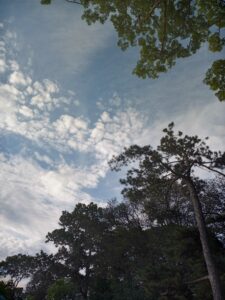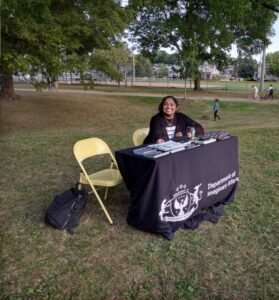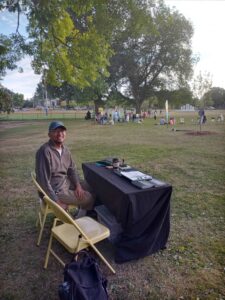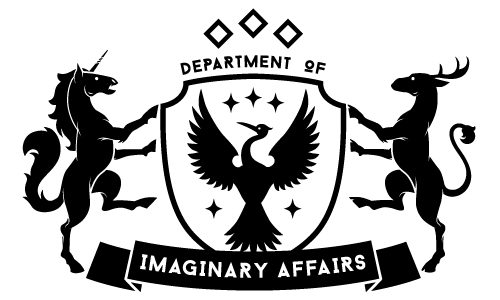
On Friday, September 3rd, 2021, marks the second time Ari and I (Elvin) met as we spent our entire day tabling and building connection together at Dentonia Park. Prior to us meeting, I reached out to Ari to offer support for their outreach efforts, as they have been tabling at the Crescent Town/Dentonia Park for the past couple of weeks by fostering a presence for community members to share their stories. This was also an excuse for me to get out of the house, support one of our team member’s, and take care of my wellness by being at a park with good company. This entire day brought Ari and I closer, as we shared our struggles and most importantly cared for one another as we encountered various interactions that left us in a puddle of reflections.
The following conversation dives deep into Ari & I’s tabling in the evening at Dentonia Park, while also witnessing Shadowlands Theatre perform Home Follies, a performance about lockdown, covid and coping. Here we discuss what happened during this moment in time as we interact with young children as we tabled near the park playground.
Elvin: When we were there, we had a lot of different feelings come up for us in relation to expressing the importance of collecting and prioritizing Black, Indigenous, People of Colours (BIPOC) stories, adjusting our tabling activities to be accessible for everyone, including children, as well as dealing with our own anxieties about socializing face to face with folx in the middle of a pandemic.
Ari: A powerful moment that I witnessed that night at Dentonia Park was seeing the way the youth were interacting with one another and witnessing the sense of community that existed between them. As a park so close to their apartment buildings (Crescent Town) they had the freedom to explore the park by themselves, without the limitations or restrictions of being supervised. When we asked them about what they hoped for the future of Dentonia Park, there was a look of surprise on their face, as if they had never been asked what they hoped for the future before. Growing up as a racialized child myself, I understood the confusion of being asked a question that requires autonomy and independent thinking, something that isn’t always fostered in young racialized children. I suppose that is the beauty of this project – allowing space for imagining a better future, no matter your age or race.

Elvin: I think it’s important for me to recognize that even though I work with kids, being at the park was stressful and I didn’t know how to interact with the kids that approached the table. My body tensed up, and children of course aren’t really educated on boundaries and honestly, I was kind of concerned for them. They weren’t respecting their own boundaries which is something children need to be taught more. My ‘educator self’ wanted to come out and intervene, but also I didn’t feel like I knew the kids well enough to do so, so I just remember sitting next to Ari and being so anxious and confused by the moment and not knowing what to do. The moment Jenn intervened was such a relief because I didn’t know what to do with these children or how to interact
with them. I think that’s the thing with this project, it really calls on us to be brave outside of the Internet space and actually go and interact with people at the parks and have meaningful conversations, which, post-COVID, is a big leap for us to do. Being the Program Caretaker, I can’t even imagine the amount of anxiety that the Social Researchers have going to the park and putting themselves through the wringer to interact with people.
Ari: What you said to the kids was helpful though in my opinion, I realize I wouldn’t have even known how to take that moment and try to shift a child’s thinking, especially because they were so energetic and had so many questions about what we were doing, and it just got me kind of frazzled. But, you did take that moment to try to shift their thinking and it just made me realize the responsibility we have as social researchers on this project, that we do have that opportunity to shift thinking which is such an important thing to do. I’m also doing my masters now in education and I really am starting to realize the ways that this project makes me think differently about how to educate and interact with children by honouring them as people and not dismissing their thoughts or experiences, so that was a valuable experience and it made me think a lot about my role in this project too.
It also never occurred to me that I was having to relearn how to socialize post-lockdown. It’s weird, for example, it had been a really long time since I had interacted with children before that day, and I didn’t expect to be as flustered as I was, because I used to be great with kids. But now, especially with the scope of this project, it’s definitely made me think twice about how to best interact with kids and make this project something that is fun and interesting for them as well. I think it helped me that you, [Elvin] and Jenn were there to help me kind of adapt what we were doing, like the tabling activities, to make it work for children and make it accessible for them. That was super helpful for me, because the next day I was able to go back out to the park and table and there were children there that were interested in what I was doing and wanted to get involved. After experiencing that first moment with children at the table I was better equipped to make it something interesting for the kids the following day.

Elvin: It’s interesting that you took what you learned and transformed it to how you would behave and interact with children the next day. I think that’s why spending the day at the park with you was so important because it was personally my first time being in a public space that I wasn’t familiar with so it was comforting to have you there and have you support me through my anxieties of interacting with people. It was also nice to be able to take turns relieving each other of our anxieties so that we could take turns interacting with people and contribute to those mini-conversations in other ways with that extra person there. Coming out of a pandemic, this project is so integral, and the important foundation of it is to interact with people and make them feel safe and empowered to share stories. But also, how do we do that as researchers when we’re anxious? It makes me wonder how people are interacting with each other on a daily basis now while we’re still in the middle of a pandemic.
In this conversation, we reflected on our struggles while interacting with young children and with others as a duo at the park. In our reflection, we tried to navigate the root cause of our anxieties in engaging with folx. We also tried to hold space for the fact that for some of us, this was a new space that we were entering for the first time.
Lessons that came out of this experience were:
🌱 Having a team of two at the park engaging with the community has a more rich result as the team relies and reflects with one another in their different encounters
🌱 Having more hands on and interactive activities for folx to engage with at the table to feel more comfortable opening up and sharing a story with us
From these lessons, this sparked some questions & insights to think about:
✨ How do people feel comfortable engaging with others during the pandemic?
✨ How do kids feel comfortable engaging with others during the pandemic?
✨ What can we change about our approach to make people feel more comfortable?
As we move forward with this project, we constantly try to adapt what we do and how we do it to make sure we are meeting the needs of the communities we are engaging with. We want to hear your feedback on how we move forward with ‘A Tale of Two Parks’. We want to offer the communities we are working with to provide us with suggestions and criticism on how we collect stories and share them. To get involved and share your feedback, we encourage you to please email Ari (ari@dia.space) or Elvin (elvin@dia.space). We look forward to listening to your insights and incorporating them through our process. Until then, tune-in in a couple of days from now, as we share part 2 of our encounters of team tabling at the park!
